Contents
Dogs are truly a man's best friend as they love to do whatever their human is doing and that includes but is not limited to wanting to eat whatever they see you eating whether it’s pizza, chicken, cake, etc.
If you don’t know what to do when you sit down and finally get to open up that jar of delicious pickles you’ve been daydreaming all day about to eat for a few days but you find your dog right next to you, drooling and wanting a piece of that goodness he sees you gobbling down then read on further below to find out if your furry friend can enjoy the taste of pickles or not.
What exactly are pickles?
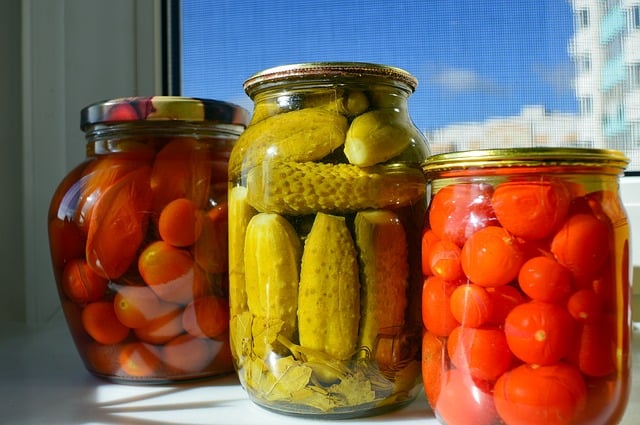
The word pickle itself means salt or brine which originates from the Dutch word "Pekel”. This savory treat has been around for a long time dating way back to 2030 BC. It is basically when food items such as carrots, peppers, cucumbers go through the process of pickling. Pickled cucumbers are usually the first choice of the majority of the people who are a fan of eating this snack.
The pickling technique was found In India and now it’s used everywhere around the world to make this flavorsome snack. It’s so easy that people can easily make it at home instead of going to the store to buy it.
Now you must be thinking about what happens in the process of pickling? Is it really that bad for dogs as fresh cucumber itself is a healthy treat for them consisting of vitamin A, K, and C along with minerals such as calcium, potassium, magnesium, etc.
Well, here’s what you need to know, the term pickling is used to describe the way a food item is preserved or fermented. It’s done by using different ingredients such as apple cider or distilled white vinegar, the former being more commonly used or even salt.
The acid or salt content being used is what helps to kill off any bacteria that could potentially spoil the food. The amount of the vinegar and salt in the pickle varies depending on if it’s homemade or if store-bought then each brand has its own proportion that they add. This is what determines if it is okay for your dog to consume the pickle or not.
Common ingredients used during the pickling process
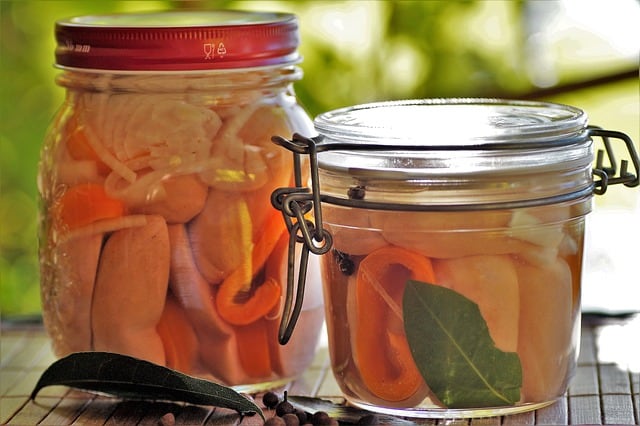
The ingredients added during the process of pickling depend as there is a lot of pickle variety that can be found these days. Listed below are a few examples of common pickles found and whether it’s okay if your dog devours them or not.
1. Dill pickle
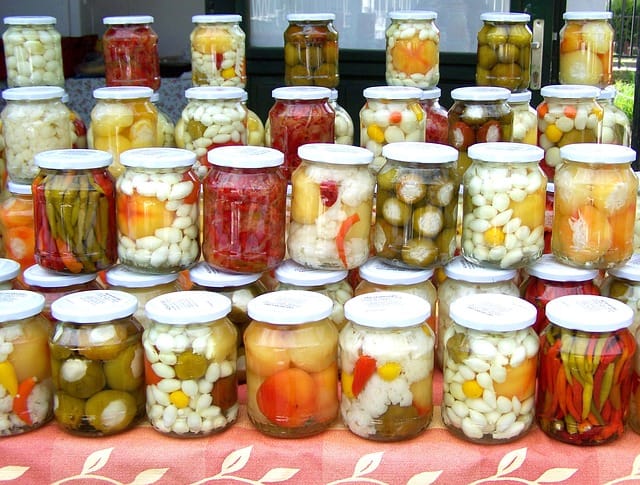
Starting off with dill pickle, it’s the least harmful out of all the pickle variety present out there in the world. These are cucumbers soaked in salt, vinegar, and other spices and this good thing about this type of pickle is that it’s not harmful to your dog.
Fresh dill is very beneficial to the health of your pup as it has incredible antioxidant properties along with aiding digestion and preventing some cancers. It can also help with your dog's mouth odor and freshen it up.
However, due to the pickling process, these nutritious value becomes of no use and it gets destroyed. It’s okay if you give dill pickles as an occasional treat but make sure not to make it a regular everyday habit as that can cause harm to your dogs' health.
2. Onion and garlic

The answer is absolutely no if you’re thinking whether dogs can be fed pickles that contain onion and garlic as well. These two vegetables contain an organic compound known as “n-propyl-disulfide which can lead to clumping of the hemoglobin known as “Heinz bodies” making it hard for the red blood cells to carry oxygen like they normally do.
This progresses to result in a disease called hemolytic anemia in which there is the destruction of your dogs' red blood cells. So, be very cautious and look at the ingredients before you decide to give a bite of this treat to your pup.
3. Sweet pickles
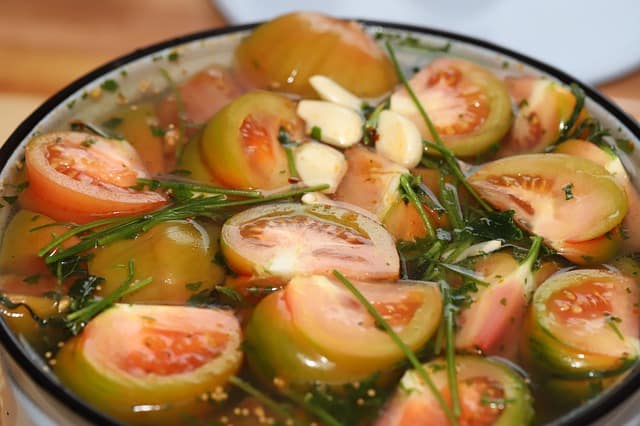
By the word “sweet”, you already know it’s going to contain sugar in it which is bad for your dog's teeth health. Although it does depend on the quantity and other elements mixed in to decide if it’s alright if your furry buddy takes a bite or two.
If the recipe consists of cinnamon or nutmeg then it’s better to avoid feeding your dog that especially not to be given in large amounts as they contain a compound called “myristicin” which can be toxic to your canine If consumed.
Another thing that is toxic for a dog is if the sweet pickles contain artificial sweetener, Xylitol so always read the label to prevent putting your dog in danger. If your pet is overweight or a diagnosed diabetic then sweet pickles are a no-no. After excluding all this, if the pickle consists of just cloves and some other spices then it’s fine if given in small amounts once in a while.
4. Pickled ginger
Ginger is helpful and often recommended to be a part of dogs' food. It’s known for its being beneficial in treating nausea, motion sickness, and stomach aches however too much of a good thing can turn bad as well so always give small quantities. Pickled ginger also aids in stomach-related issues as long as it’s given in moderation.
Excess of this ingredient can result in heartburn, bloating, and gas. Another way you can add ginger to your dogs' diet is by making gingerbread cookies! This way you’ll avoid the extra amount of salt and vinegar that’s present in pickled ginger.
5. Pickle juice
This is definitely a big NO. Pickle juice contains vinegar, salt, and spices which can all be very dangerous for the dog.
How unsafe can a pickle be for a dog?
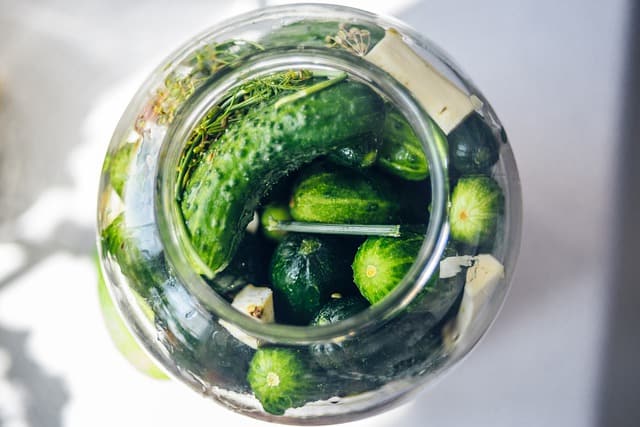
Before giving your dog the pickle treat, it's important to consider different factors such as whether it was store-bought or homemade and of course the ingredient it contains. First, let's look at the risks associated with your dogs' health if they consume pickles. As mentioned above, we know that during the pickling process salt is usually added, which in high quantity can be injurious to your furry friend.
The normal amount of sodium allowed per day for a dog according to the Association of American Feed Control Official is 0.3%. Increased intake of salted pickles can lead to short-term issues such as increased thirst, vomiting, and diarrhea which can lead to stomach bloating, seizures, and lethargy. Long-term consequences of high salt intake are high blood pressure, kidney dysfunction, or heart disease.
Vinegar is another ingredient used for the fermenting process and due to its strong smell, it can lead to nausea and vomiting in some dogs after they sniff it. If your dog has a kidney problem then avoid vinegar at all costs as that can worsen their disease leading to renal failure.
Coming to pickled garlic, onions, and chili, this trio is not safe at all for your fur friend due to the chemicals they contain that are extremely poisonous if eaten up. The effect of these ingredients doesn’t happen in a day, the symptoms develop gradually.
In case your dog has eaten these forbidden pickles, watch out for signs and symptoms of anemia which can include; urine which will be of a dark color than normal, tiredness and fatigue, food aversion, kidney damage. So, no matter how many cute puppy face your pet makes at you, you’ve got to stand your ground and let them know that they cannot have this and find another alternative treat to give them instead.
Although it’s very rare, some dogs tend to be allergic or intolerant towards pickles. If your dog shows signs of allergies after having a pickle, take them to a vet and stay clear from feeding them pickles ever again.
Types of pickles safe for dog consumption
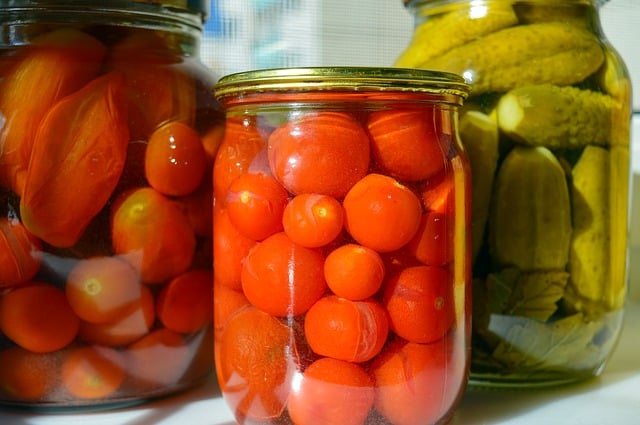
Even though no pickle is safe for a dog to consume every day or in large amounts, there are a few types that are safe enough to give from time to time. You’re allowed to give your dog one or two small slices of dill kosher pickle which got the “kosher” part from the Jewish New York pickle makers who are known to add main 3 key ingredients, dill, salt, and garlic.
Apart from that, you can also feed sweet pickles as a treat if your dog doesn’t suffer from diabetes or any kidney-related issues, or just go ahead and give the regular pickle. Since the pickling effect takes away most of the nutrients there may be no benefit in giving this snack but one thing it will do is that it’ll make your furry best friend very happy!
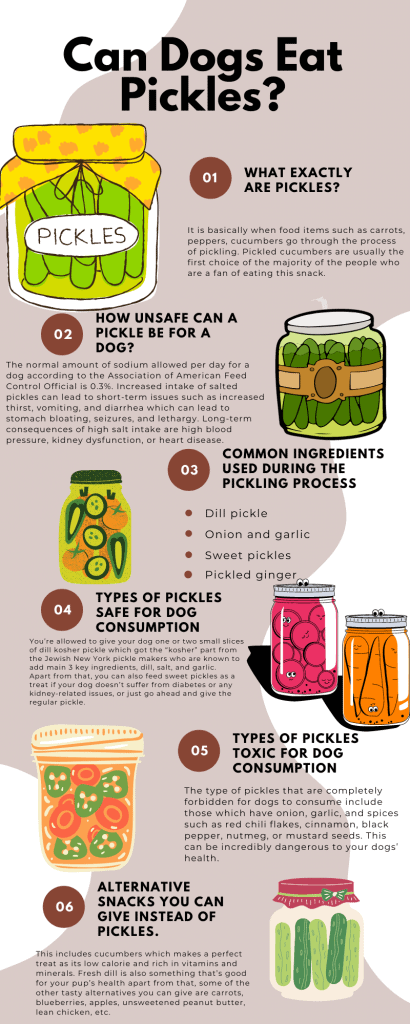
Types of pickles toxic for dog consumption
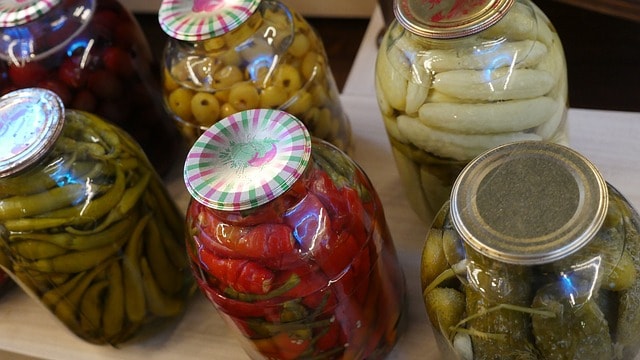
The type of pickles that are completely forbidden for dogs to consume include those which have onion, garlic, and spices such as red chili flakes, cinnamon, black pepper, nutmeg, or mustard seeds. This can be incredibly dangerous to your dogs' health.
One of the common false information that people spread around is that pickle juice should be given to a dehydrated dog. That is not true because no research supports this and due to the high salt content and the acidity from the vinegar, it is bound to make the condition worse rather than fixing it.
So if you’ve got a jar of pickles at home and you don’t know the ingredients of it then don’t risk it and avoid giving it to your dog to prevent any mishaps.
What you should do if your dog ate a pickle
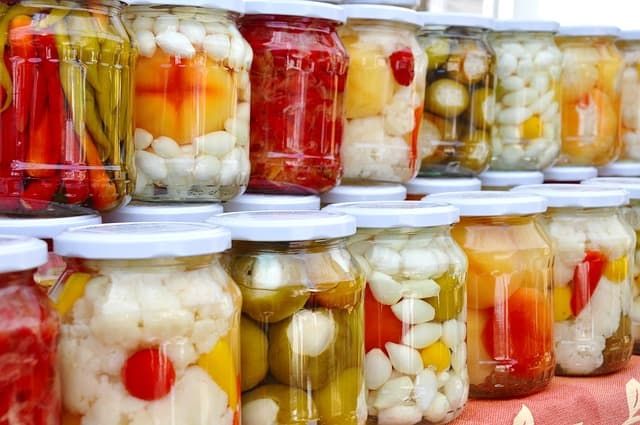
If you accidentally dropped a pickle and your dog took advantage and sneakily gobbled it down then the first thing to do is to not panic. Find out what were the contents of the pickle ingested by your dog in case you didn’t already know however it’s very likely that your dog will have any adverse side effects from a one-off.
All you’ve got to do is keep a watch on them for a day or two to watch out for any changed behavior or symptoms. If you do find them acting strange then don’t wait and take them to the vet right away to get a full check-up. For prevention of these accidental food drops, try not to eat in the same room your dog is present in, and if that’s not possible then be cautious and make sure not to drop the pickle while you eat.
Alternative snacks you can give instead of pickles.
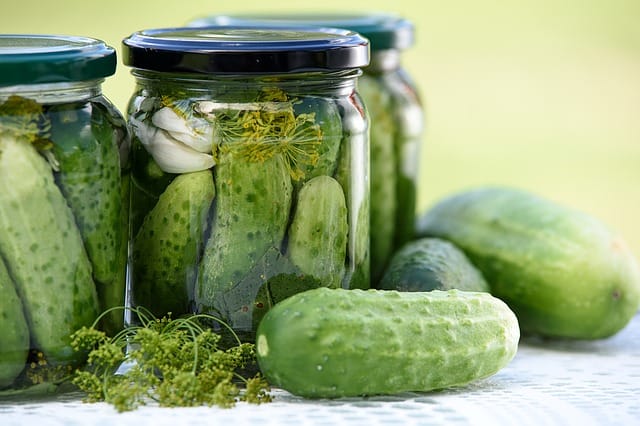
If you’re too unsure on whether you should be giving your dog pickles or not then there are a lot more other healthier and completely safe options present that you and your dog both can enjoy together!
This includes cucumbers which makes a perfect treat as its low calorie and rich in vitamins and minerals. Fresh dill is also something that’s good for your pup's health apart from that, some of the other tasty alternatives you can give are carrots, blueberries, apples, unsweetened peanut butter, lean chicken, etc.
However, before giving treats always remember the rule that only 10% of the daily calorie intake should be given to treats. The rest of the 90% calories should be fulfilled by their proper main healthy meals.
The answer to the question of whether dogs can have pickles or not can be a yes or no, both as it all depends on multiple factors such as the type of pickle, the ingredient it contains, your dogs' overall health. Once you’ve taken into account all the things along with taking the vet's advice then you can decide whether there’s a green signal to your dog eating the scrumptious treat or not.
If you still find yourself confused and unsure about feeding your pet pickle then it's better to just avoid it and give other much healthier and equally tasty treats instead because as it’s said prevention is better than cure!




Leave a Reply
You must be logged in to post a comment.